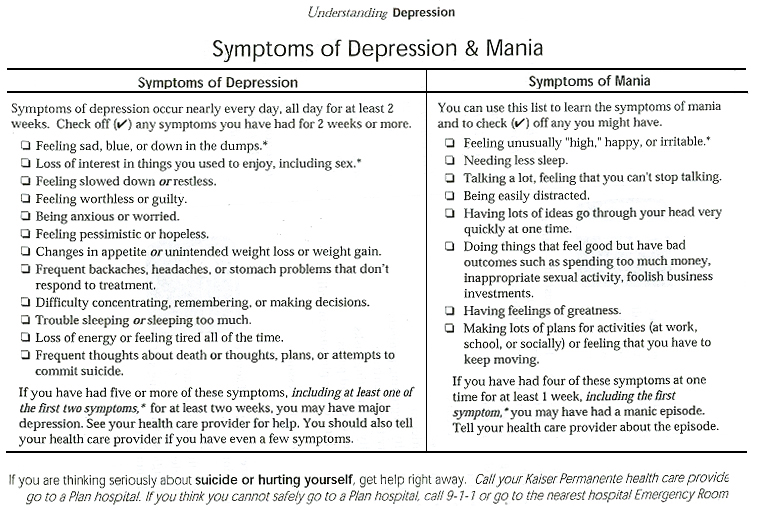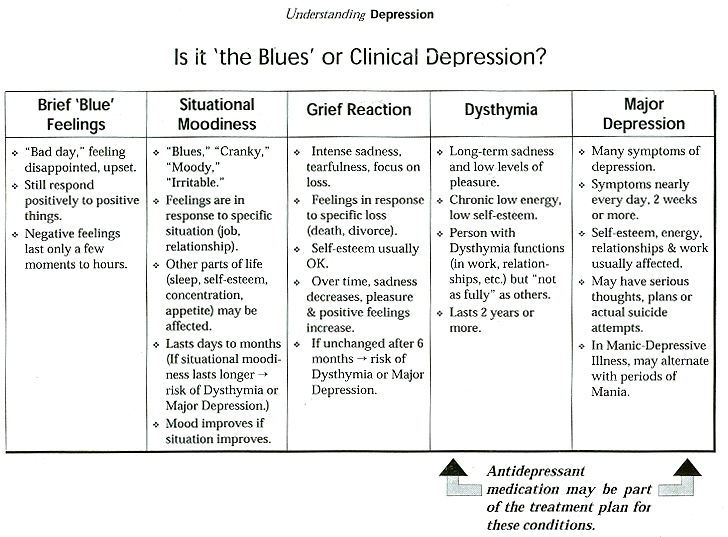|
What is Depression?
Depression is often missed by both patients and healthcare providers because the symptoms are not well understood. There also remains significant stigma about both the diagnosis of depression and the treatment of depression with medication. Depression occurs in all age groups, all ethnic backgrounds, all occupations, and in both men and women. Women are diagnosed more frequently than men as they are more likely to seek treatment. The following is a partial list of the occupations listed by patients who were being treated for depression in one recent study:
Consumer Advocacy
History
Horticulture
Education
Baking
English
Public Relations
Telemarketing
Physician
Customer Service
Real Estate |
Paralegal
Research
Computers
Microbiology
Plumbing
Counseling
Attorney
Pharmacy
Theology
Music Composition
Dancing
|
Massage Therapy
Police Detective
Insurance
Social Work
Graphic Design
Nursing
French
Library Science
Retail Sales
Sales |
Is depression a biochemical problem?
Whatever the root cause of depression from patient to patient, it is marked by the same reduction in biochemicals in the brain call neurotransmitters. These neurotransmitters (norepinephrine and serotonin) work in the brain and affect mood.
Won't depression just go away?
It might if you have several years to spend waiting. Keep in mind it is not possible to "will" depression away; it is also not possible to "just shake it off."
How can I resolve the symptoms of depression?
Exercise can raise the levels of neurotransmitters and that is an option for those with mild to moderate depression. Antidepressant medication is another safe way to regulate the amount of circulating neurotransmitters in the brain.
How can antidepressant medications help me?
Antidepressant medication is very often the first step to long-term weight loss. Medication reduces the internal chaos sufficiently to allow one to focus more clearly on the conflict or grief which produced the depression in the first place (and led to overeating). Symptoms of depression may appear when food is withdrawn; food can mask the symptoms of depression, as does alcohol, smoking, overspending, promiscuity, or gambling, etc.
Are antidepressant medications addictive?
Antidepressant medications are not addictive. They are quite different from medications like Valium and Librium which are not antidepressants but tranquilizers.
How long would I have to take medication?
Although one could stop anytime, most people take the medication for at least six months. Long-standing depression often requires a longer period of treatment.
What about side effects?
Nine out of ten people are not bothered by any side effects. Side effects that do occur can usually be relieved by an adjustment of the dose or a change to a different medication. Discuss any concerns with the prescribing health care provider.
What are the signs or symptoms of mild depression?
The following list is just a small sampling of some of the symptoms of mild to moderate depression:
- Disturbed sleep (sleep is not restful-either not enough sleep or excessive_
- Chronic impatience or irritability
- Rage episodes
- Feeling numb
- Fatigue
- Frequent tears
- Anxiety
- Self-criticism
- Difficulty beginning projects
- Inability to concentrate
- Difficulty completing tasks
- Chronic aches and pains
- Loss of interest or pleasure in ordinary activities
- Agitation or restlessness


<>What are the signs of severe depression?</>
Some of the symptoms are:
- Hopelessness
- Thoughts of harming self
- Self-mutilation
It's been troubling me. Now, why is it that most of us can talk openly about the illnesses of our bodies, but when it comes to our brain and illnesses of the mind we clam up and because we clam up, people with emotional disorders feel ashamed, stigmatized and don't seek the help that can make the difference. - Kirk Douglas
Local Resources:
San Diego County Mental Health Services 619 563-2700
Feighner Research Institute 858 554-0100
Alexandra - Spiritual Psychic and Teacher - 619 298-3422
Never has the Alexandra Institute endorsed or sponsored a psychic (900) phone line "service."  |